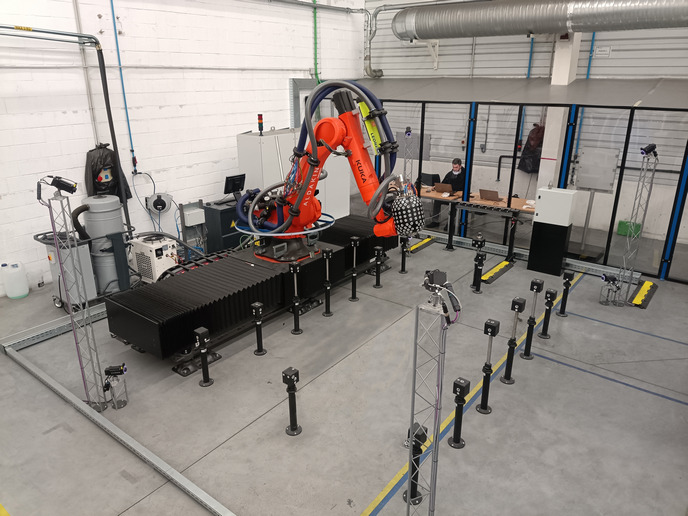Cleaner robotic manufacturing
Manufacturing is one of the strongest pillars of the European economy, employing millions of people and generating trillions of euros in revenue. Across various sectors such as transportation, energy generation and construction, there is a clear shift to replace metal parts by composite parts. This transition aims not only to reduce the weight of the components but also to enhance product performance. Yet the manufacturing process of composite parts presents a significant challenge: the generation of considerable dust. This dust contains fibres(opens in new window) and poses significant health risks to the skin and eyes of workers, as well as to the lungs when inhaled. Therefore, there is an urgent need for cleaner manufacturing processes.
A robotic system with internal dust suction
The manufacturing of composite parts traditionally relies on manual labour or the use of milling machines, which often come with a hefty price tag and a rigid operational framework. To reduce the generated potentially carcinogenic dust while offering exceptional precision in composite part manufacturing, the EU-funded FIBREMACH(opens in new window) project developed an innovative robotic system. “Unlike existing robotic solutions, the FIBREMACH system provides high-quality manufacturing and incorporates an internal dust suction mechanism(opens in new window) minimising the exposure of operators to hazardous dust particles,” highlights project coordinator Ibai Inziarte. By capturing dust directly at the cutting edge, the system surpasses the effectiveness of traditional external suction methods. Through a meticulously designed funnelling system, dust is efficiently contained and processed(opens in new window), ensuring a safer and cleaner working environment.
Cameras and sensors for high-precision machining
The FIBREMACH project has pioneered several key technological innovations including the integration of high-precision cameras(opens in new window) to continuously track the robot's position and orientation. This system corrects any deviations in real-time, enabling extraordinary machining accuracy within a fraction of a millimetre. “This level of precision represents a significant advancement over existing automated solutions, meeting the stringent accuracy requirements of high-value applications,” emphasises Inziarte. Furthermore, the incorporation of vibration and force sensors allows the system to monitor the machining process in real time and detect vibrations that may harm the composite product. Not only does it alert operators to potential issues, but it also suggests corrective measures to optimise cutting conditions.
Adaptability to industrial scale
Importantly, the robotic architecture developed under FIBREMACH is scalable and easily adapted to robots of different sizes. This flexibility ensures that companies currently engaged in manual milling, trimming and drilling of composites, or those using milling machines, can transition to a robotised solution boosting productivity. The efficacy and reliability of the FIBREMACH system were rigorously tested at the facilities of AERNNOVA, a key project partner. Validation tests, which included machining critical aerospace components, showcased the system's ability to efficiently remove all the dust generated during machining. Recognising its groundbreaking innovation, FIBREMACH won the 2023 Machine Tool Innovation Award(opens in new window) by the European Association of Manufacturing Technologies (CECIMO). This further reinforces its potential to revolutionise composite part manufacturing, offering not only unparalleled precision but also a safer and cleaner working environment and ultimately driving the competitiveness of European manufacturing.







